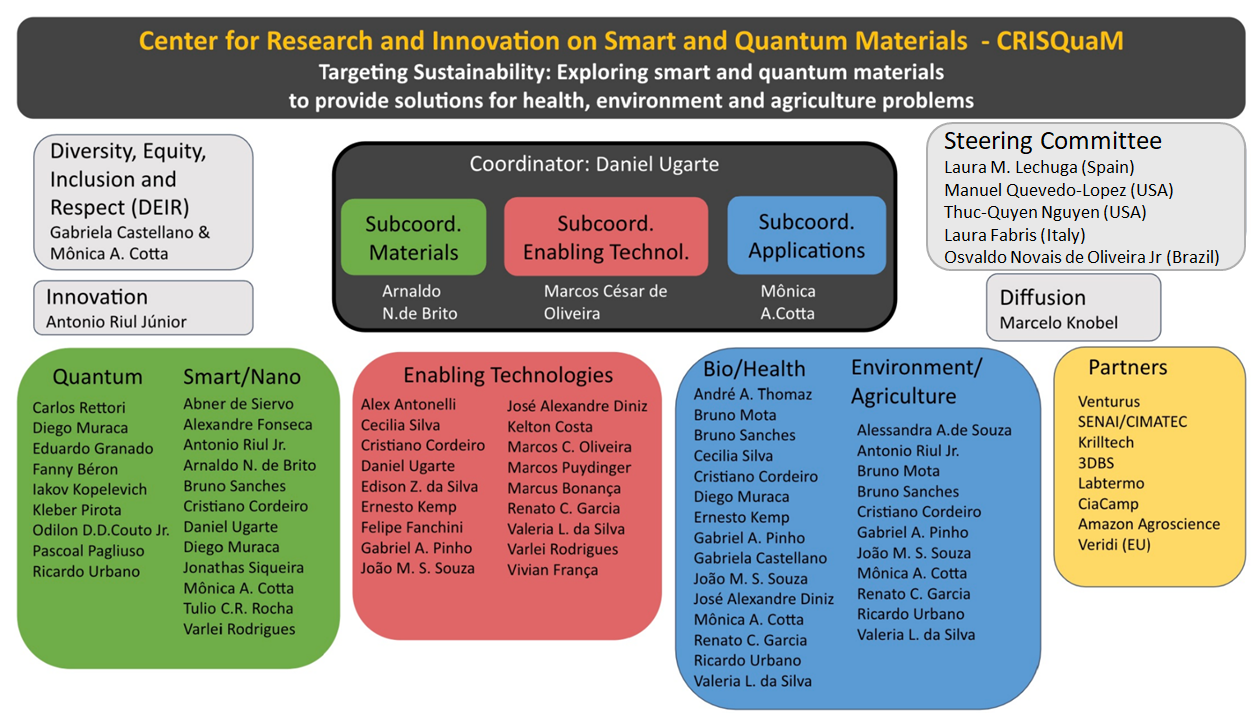BV-FAPESP: research projects supported in this Center
CRISQuaM in the Media: news about the center
CRISQuaM aims to explore the synergistic development of fundamental and applied science to create new materials with high potential for the construction of devices and sensors to address technological challenges related to sustainability, climate change, precision agriculture, ecology, and health. To achieve these goals, we have assembled an interdisciplinary and collaborative research team, integrating expertise across various scientific domains, researching novel materials with high innovation potential. By combining original synthesis methods, advanced characterization techniques, theoretical approaches, computational simulations, quantum technologies, and device construction designs, we aim to drive advances in smart and quantum materials, promoting scientific excellence and technological development. With this, we plan disruptive innovations in instrumentation—including hardware and AI-based tools—as well as in quantum technologies, biomedical devices, and signal processing, in addition to plant bionics, exploring plant-pathogen interactions. Besides research activities, we plan intensive actions in education, dissemination, and communication for the general public, as a modern society should be aware of the challenges humanity faces and how research and technology are essential for responsibly utilizing the planet's limited resources. CRISQuaM's Innovation activities are accelerated through partnerships with several companies in related technologies, many of them Brazilian. Finally, all activities of the Center are managed in accordance with diversity, equity, and inclusion goals and best practices.
The Center brings together scientists, engineers, and innovators in a collaborative effort to apply materials science and quantum technologies at the cutting edge, designing new materials and nano(bio)sensors for advanced diagnostics. The Center has a team capable of producing a wide range of (nano/micro) materials, along with precise chemical and physical characterizations using modern techniques (synchrotron, advanced microscopy, magnetotransport, magnetic resonance, optics, etc.). In addition, the team offers various options in enabling technologies, including miniaturization, processing, and additive manufacturing, as well as instrumentation, quantum sensing, and electronics development. Data analysis will employ updated approaches (numerical simulation, classical and quantum machine learning, and quantum optimization). Applications at the knowledge frontier will address urgent sustainability needs in environmental areas, precision agriculture, plant bionics, and biomedical interfaces, contributing to the development of local technologies in close partnership with the Brazilian industry.
The organization of the Center is based on three pillars — Materials, Enabling Technologies, and Applications — together with partner companies, as described in the figure below.

2023-10-04
‘Amazon Day: Science for the Amazon’ was held on September 15, during the 78th United Nations General Assembly. Panelists discussed the role of science, technology and innovation in sustainable development for the region.
2023-10-04
Brazilian researchers screened 160 compounds known to be effective against SARS-CoV-2 and identified those that also act against the protozoan parasite Toxoplasma gondii. The most promising will be tested in humans for treatment of the chronic form of the disease.
2023-10-04
Researchers at the University of São Paulo showed in mice the importance of the signaling pathway mediated by the pro-inflammatory cytokine TNF-α and its receptor TNFR1; the discovery could now help scientists develop medications for oral health.
2023-10-04
Subnational funding agencies and Brazil’s National Scientific Council will partner to allocate almost BRL 60 million to research projects that explore little-known areas of the world’s largest tropical forest.
2023-10-02
The study was conducted by researchers at the University of São Paulo, highlighting the importance of identify and isolating infected patients on admission to the emergency room. The findings also showed that containment may be impaired if patients stay more than two days in the ER.
2023-09-27
A seminar hosted by the steering committee for the FAPESP Bioenergy Research Program featured researchers and representatives of the public and private sectors. A rapid and substantial increase in production of sustainable aviation fuels was the option considered most consistent.